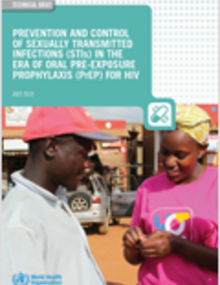Trichomoniasis, caused by the protozoan parasite Trichomonas vaginalis is the most common curable sexually transmitted infection (STI) worldwide. In comparison to Chlamydia and other STIs with prevalence rates highest in women ages 15-25 years, T. vaginalis infection appear to peak substantially later in life (between 40-50 years of age).
Trichomoniasis in pregnancy can lead to premature birth and low birth weight.
Screening for other sexually transmitted diseases in persons with trichomoniasis is advisable wherever resources permit. Trichomoniasis is treated with antibiotics.
Trichomoniasis is asymptomatic in at least 50% of women and 70-80% of men.
- La infección por tricomas en las embarazadas puede causar resultados adversos en el embarazo.
- Se ha observado que la tricomoniasis aumenta la vulnerabilidad a propagar o contraer otras ITS, incluida la infección por el VIH.
- La tricomoniasis se puede tratar con antibióticos. Las personas que han recibido tratamiento para la tricomoniasis pueden contraerla nuevamente.
Trichomoniasis is a sexually transmitted infection and is caused by a protozoan parasite, Trichomonas vaginalis.
You can get trichomoniasis by having unprotected vaginal sex with someone who has trichomoniasis. Infections in other parts of the body such as month and anus are possible, but not common. You can still get trichomoniasis even if you had it in the past and got treatment for it. You can also spread trichomoniasis to your child during birth.
Around 50% of women and 70-80% of men do not notice any symptoms from trichomoniasis. If you do have symptoms, they can appear in different forms. Women might notice abnormal vaginal discharge with unusual smell, genital pain or soreness, discomfort with urination and vaginal itching. Men might notice urethral discharge, burning after urination or ejaculation, and/or itching or irritation inside the penis. When infected, sex can become unpleasant.
Trichomoniasis infection in pregnant women can cause adverse pregnancy outcomes, particularly premature rupture of membranes, pre-term delivery and low birth weight.
Trichomoniasis have been shown to increase the vulnerability to spreading or getting other STIs, including HIV.
Trichomoniasis infection in pregnant women can cause adverse pregnancy outcomes, particularly premature rupture of membranes, pre-term delivery and low birth weight.
Diagnosis are, if possible, done in a laboratory using different samples, including urine, vaginal, cervical and urethral swabs. However, since laboratory diagnostic tests are not available in many countries, diagnosis is often made by a qualified health provider based on the presence of symptoms such as vaginal and urethral discharge.
Correct and consistent use of condoms decreases the risk of infection during vaginal sexual contact. Infections in other parts of the body such as month and anus are possible, but not common.
Trichomoniasis can be treated with antibiotics. People who have been treated for trichomoniasis can get it again. To avoid reinfection, all sexual partners should be treated at the same time.
- The global response to STI is currently guided by the Global health sector strategy on sexually transmitted infections, 2016 -2021.
- PAHO/WHO publishes guidelines and handbooks for surveillance, treatment, and strategies to support its Member States response to STIs.



